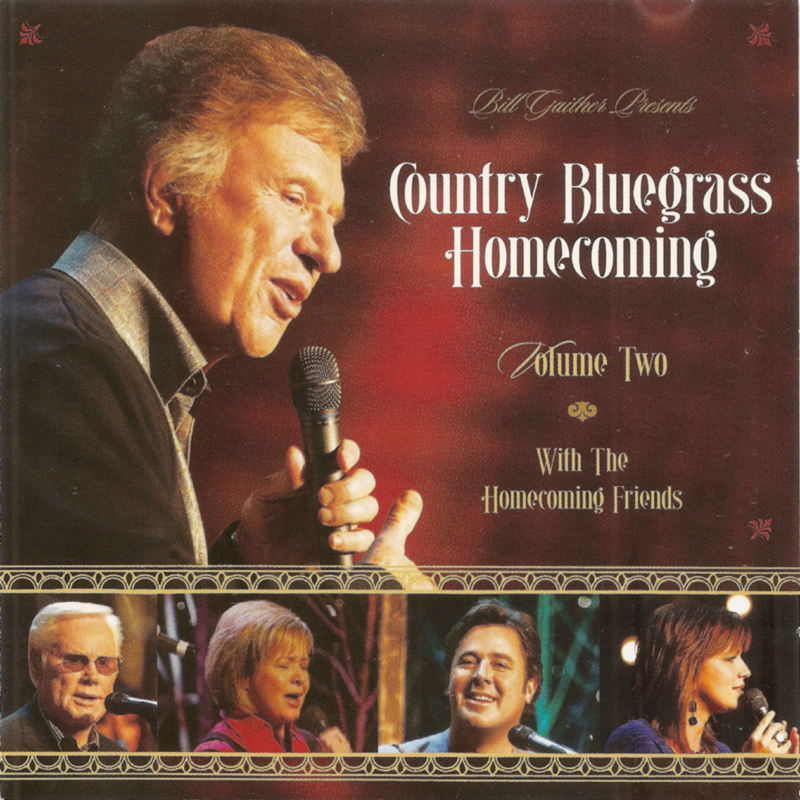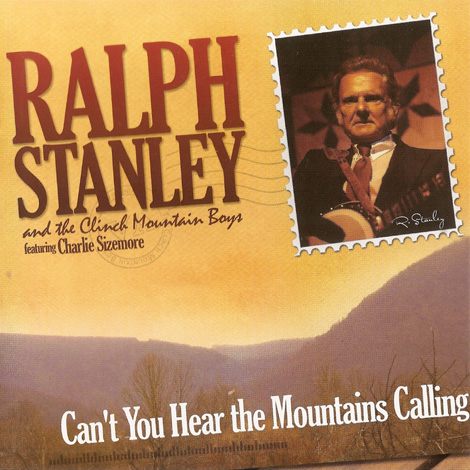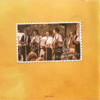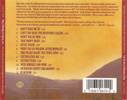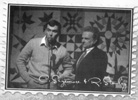- Bill Gatton Chevy Show
- Carter Stanley Interview - 1966
- How Far To Little Rock? - Search live shows
- Jim Kent's film 'Ralph Stanley's Bluegrass Festival'
- New WCYB Recording
- Pound Va. 1972 - Video
- Replica Rebel T-Shirt
- R.I.P. Ralph
- Roy Lee Centers Last Show
- Song & Memory Books
- Stanley Brothers - WCYB Acetate
- Stanley Standard - Carter Stanley Memorial Issue
- Suwannee River Jamboree
- Up In The Cloud - 1957-62
Ralph Stanley - Can't You Hear The Mountains Calling
(Rounder 11661-0614-2) 2009
As the liner notes say, this is a "remixed, remastered, resequenced, renamed" reissue of the Sings Sixteen Years (River Track Studios RTS 1097) cassette Ralph recorded in 1986.
The album was also previously reissued on CD (Copper Creek CCCD-0138) 1996.
One track has been renamed (I Lived In Her World is retitled With Whiskey And Wine).
From a side by side comparison with the original tape, it seems to me that the Rounder CD has the vocals lower in the mix and an overall fatter sound with more bass end. Incidentally, both mixes could have fitted on one CD...
The Rounder CD also has a typo in one of the picture illustrations showing David Holt (I think) instead of Charlie Sizemore!
- Ralph Stanley: banjo, vocals
- Jnr Blankenship: lead guitar
- Curly Ray Cline: fiddle
- Jack Cooke: bass
- Charlie Sizemore: guitar, vocals
The liner notes to the 2009 Rounder issue has an interesting section by Charlie Sizemore:-
Ralph Stanley's approach to making an album doesn't vary much. First, a rehearsal, usually while on the road, recorded by a small tape player. Here he determines what "works" - which is as hard to define as it is easy for him to recognize.
Many songs never get past this first reading. Consider, for example, a dreadfully sad, lyrically appealing song to which the writer has inexplicably attached a melody more fitting to a fiddle tune. Ralph's wry verdict: "I don't think we're going to record that 'dancing on Mommy's grave' song."
At the final rehearsal, which may be the first, Ralph writes up the results: who does what, when and where. He uses this to direct the band in the studio with nods here and there when someone forgets what he's supposed to be doing.
Recording the songs is equally businesslike. Brief - usually no more than one day - and "live," meaning you hear on his recordings what happens in the studio exactly as it happened. The first take may well be final; no wringing the life out of a song in pursuit of technical perfection. When Ralph declares "that felt pretty good," more often than not, after hearing the playback a time or maybe two, it's on to the next song.
"Sixteen Years" is no exception, recorded on one day, mixed and edited the next.
So why does this recording in the minds of many stand as perhaps the best work of this band - an unchanging unit for almost a decade? There is no ready explanation, but if one exists it begins with Ralph.
While not entirely comfortable with the recording process, during the making of this record he almost seems to be having fun. Curly Ray Cline and Jack Cooke, veterans both, are on top of their game. Nevertheless, the configuration of this band is relatively new. Despite the long hours, complacency is not an issue. And if it has any designs on this recording session, Ralph makes short work of thwarting it - not only by example, which is customary, but also with direct, spoken exhortations and admonitions, which is rare. At times he urges the band, in so many words, to stay alert. So part of the answer may lie here.
Or it could matter that Ralph produced and initially released this recording on his own rather than for a record company. Under no deadline and with no one looking over his shoulder, so to speak, he has no one to please but his fans and himself. Perhaps this freedom provides a lack of self-consciousness, at once energizing and relaxing him.
It might be the songs. Some have said the material on this recording is incredibly strong, even by Ralph's standards. If so, this is by happenstance, not design. With any recording, Ralph tries to put together the best songs he can find. But no doubt there are some great songs here and no recording can be better than its songs.
This sort of analysis is tempting and fun, but also fraught with folly. Who knows why music on a given day happens one way and not another? Maybe the stars align properly or lightening strikes. I don't know. I do know that one day in February a generation ago something pretty special happened. I was there . . . and I'm glad I was.
-Charlie Sizemore,
Nashville, Tennessee, 2009
| Track: |
Title: |
Time: |
Date: |
Original Release: |
|||||||||||||||||
|---|---|---|---|---|---|---|---|---|---|---|---|---|---|---|---|---|---|---|---|---|---|
| A-1 |
Don't Wake Me Up |
02:00 |
27 Feb 1980 |
Singing Sixteen Years |
|||||||||||||||||
| Lum Patton |
|||||||||||||||||||||
| Bjo | Gtr | Fid | Ld Gtr | Bs | |||||||||||||||||
| Ralph Stanley |
Charlie Sizemore |
Curly Ray Cline |
Junior Blankenship |
Jack Cooke |
|
||||||||||||||||
| A-2 |
Can't You Hear The Mountains Calling |
02:46 |
27 Feb 1980 |
Singing Sixteen Years |
|||||||||||||||||
| Jerry Williamson |
|||||||||||||||||||||
| Bjo | Gtr | Fid | Ld Gtr | Bs | |||||||||||||||||
| Ralph Stanley |
Charlie Sizemore |
Curly Ray Cline |
Junior Blankenship |
Jack Cooke |
|
||||||||||||||||
| A-3 |
(Say) Won't You Be Mine |
02:25 |
27 Feb 1980 |
Singing Sixteen Years |
|||||||||||||||||
| C. Stanley |
|||||||||||||||||||||
| Bjo | Gtr | Fid | Ld Gtr | Bs | |||||||||||||||||
| Ralph Stanley |
Charlie Sizemore |
Curly Ray Cline |
Junior Blankenship |
Jack Cooke |
|
||||||||||||||||
| A-4 |
That Happy Night |
02:50 |
27 Feb 1980 |
Singing Sixteen Years |
|||||||||||||||||
| R. Stanley |
|||||||||||||||||||||
| Bjo | Gtr | Fid | Ld Gtr | Bs | |||||||||||||||||
| Ralph Stanley |
Charlie Sizemore |
Curly Ray Cline |
Junior Blankenship |
Jack Cooke |
|
||||||||||||||||
| A-5 |
Little Willie |
02:29 |
27 Feb 1980 |
Singing Sixteen Years |
|||||||||||||||||
| P.D. |
|||||||||||||||||||||
| Bjo | Gtr | Fid | Ld Gtr | Bs | |||||||||||||||||
| Ralph Stanley |
Charlie Sizemore |
Curly Ray Cline |
Junior Blankenship |
Jack Cooke |
|
||||||||||||||||
| A-6 |
When You Go Walking After Midnight |
02:03 |
27 Feb 1980 |
Singing Sixteen Years |
|||||||||||||||||
| Roy McMillan |
|||||||||||||||||||||
| Bjo | Gtr | Fid | Ld Gtr | Bs | |||||||||||||||||
| Ralph Stanley |
Charlie Sizemore |
Curly Ray Cline |
Junior Blankenship |
Jack Cooke |
|
||||||||||||||||
| A-7 |
This Weary Heart You Stole Away |
02:26 |
27 Feb 1980 |
Singing Sixteen Years |
|||||||||||||||||
| C. Stanley |
|||||||||||||||||||||
| Bjo | Gtr | Fid | Ld Gtr | Bs | |||||||||||||||||
| Ralph Stanley |
Charlie Sizemore |
Curly Ray Cline |
Junior Blankenship |
Jack Cooke |
|
||||||||||||||||
| A-8 |
Cotton-Eyed Joe |
01:52 |
27 Feb 1980 |
Singing Sixteen Years |
|||||||||||||||||
| P.D. |
|||||||||||||||||||||
| Bjo | Gtr | Fid | Ld Gtr | Bs | |||||||||||||||||
| Ralph Stanley |
Charlie Sizemore |
Curly Ray Cline |
Junior Blankenship |
Jack Cooke |
|
||||||||||||||||
| A-9 |
Sixteen Years |
02:30 |
27 Feb 1980 |
Singing Sixteen Years |
|||||||||||||||||
| Lowell Varney |
|||||||||||||||||||||
| Bjo | Gtr | Fid | Ld Gtr | Bs | |||||||||||||||||
| Ralph Stanley |
Charlie Sizemore |
Curly Ray Cline |
Junior Blankenship |
Jack Cooke |
|
||||||||||||||||
| A-10 |
I Lived In Her World (aka With Whiskey And Wine) |
03:03 |
27 Feb 1980 |
Singing Sixteen Years |
|||||||||||||||||
| Lundy C. Fields / Lowell P. Varney |
|||||||||||||||||||||
| Bjo | Gtr | Fid | Ld Gtr | Bs | |||||||||||||||||
| Ralph Stanley |
Charlie Sizemore |
Curly Ray Cline |
Junior Blankenship |
Jack Cooke |
|
||||||||||||||||
| A-11 |
Dickenson County Breakdown |
01:45 |
27 Feb 1980 |
Singing Sixteen Years |
|||||||||||||||||
| R. Stanley |
|||||||||||||||||||||
| Bjo | Gtr | Fid | Ld Gtr | Bs | |||||||||||||||||
| Ralph Stanley |
Charlie Sizemore |
Curly Ray Cline |
Junior Blankenship |
Jack Cooke |
|
||||||||||||||||
| A-12 |
In Despair |
02:12 |
27 Feb 1980 |
Singing Sixteen Years |
|||||||||||||||||
| Joe Ahr / Juanita Pennington |
|||||||||||||||||||||
| Bjo | Gtr | Fid | Ld Gtr | Bs | |||||||||||||||||
| Ralph Stanley |
Charlie Sizemore |
Curly Ray Cline |
Junior Blankenship |
Jack Cooke |
|
||||||||||||||||
NB: Liner notes don't specify instruments/vocal parts for individual tracks.

